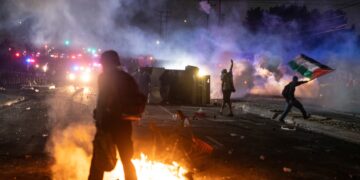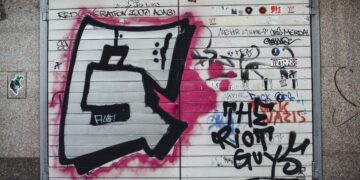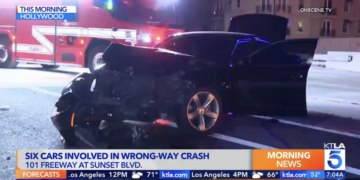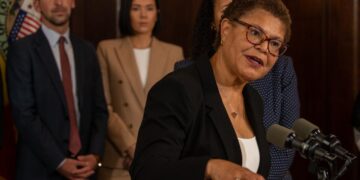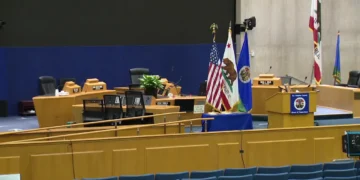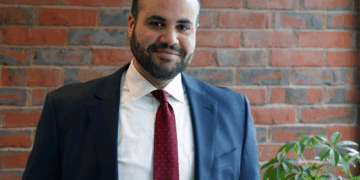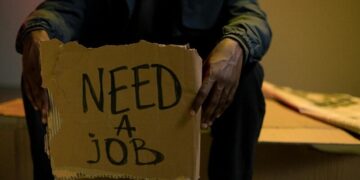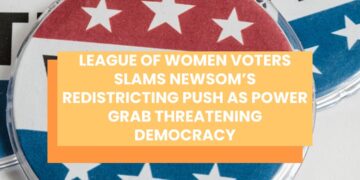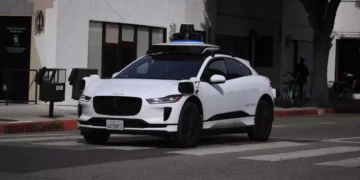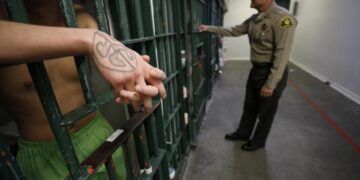“I’m always glad when bigots die,” said UCLA’s Johnathan Perkins.
It’s been just over two weeks since the assassination of conservative commentator Charlie Kirk, who was fatally shot at a campus event at Utah Valley University. While most—even those not on the Right—condemned the attack as ghoulish, cowardly, and intolerable, there have been several notable instances of high profile officials, administrators, and influencers making vitriolic remarks about Kirk’s death. One such example was Johnathan Perkins, the Director of Race and Equity for UCLA’s Office of Equity, Diversity, and Inclusion.
Perkins took to social media with foul remarks celebrating Kirk’s murder: “I’m always glad when bigots die, so.”
“It is OKAY to be happy when someone who hated you and called for your people’s death dies—even if they are murdered,” Perkins wrote. In another post, a user commented that Kirk “shouldn’t be dead,” to which Perkins replied: “Why shouldn’t he be dead?”
Another one of Perkins’ posts said that “if Hell is real, Charlie Kirk is certainly in it now.”
Within hours, UCLA announced that Perkins had been placed on administrative leave pending an internal review.
“UCLA has placed a campus employee on immediate leave and has launched an investigation following reports of social media posts regarding the murder of Charlie Kirk. While free expression is a core value of UCLA, violence of any kind—including the celebration of it—is completely unacceptable and will not be tolerated.”
“It doesn’t matter in the slightest what your political beliefs are or whether you think someone else is right or wrong,” said James Milliken, President of the University of California. “You can ignore a speaker, you can argue with them, you attempt to convince others you are on the side of right. What you cannot do in a civilized society is use physical violence against someone with whom you disagree. This is not just my view—it is the foundation upon which great societies and great universities, such as the University of California, are built.”
The move by UCLA, however, has sparked a new debate—not only about the conduct of one administrator, but about why UCLA continues to maintain a sprawling diversity, equity, and inclusion DEI bureaucracy in the first place.
“Why does UCLA even have a DEI department anymore? I thought that was made illegal in the public sector?” comments one Kevin Kayser on a Daily Bruin article about Perkins’ remarks.
The short answer to Kayser’s question is no. There is no federal law that makes all DEI initiatives illegal in the public sector. While the Trump administration has been working to dismantle DEI initiatives in the federal government, they have broadly condemned public universities still clinging to their respective programs and have employed federal agencies to investigate these policies on a case-by-case basis. Any specific DEI practice that violates anti-discrimination laws, such as Title VII of the Civil Rights Act, would be unlawful.
That said, there is an argument to be made—a compelling one at that—to suggest that universities are deliberately walking an extraordinarily fine line on purpose.
In a relatively recent landmark SCOTUS case, the U.S. Supreme Court ruled that affirmative action and the use of race in college admissions are unconstitutional. This dramatically curtails one of the central justifications for race-focused programs and was a serious blow to DEI advocates. After Trump’s inauguration in 2025, many universities preemptively scaled back or entirely did away with their DEI initiatives in anticipation of—or in some cases, in response to—federal pressure. UCLA, however, has continued to defy the trend.
Opponents argue that offices like the one Perkins leads have become ideological echo chambers that enforce conformity rather than genuine dialogue. They question why taxpayer-funded universities continue to employ administrators who display open hostility toward certain groups.
“According to Transparent California’s database, Perkins received pay of $131,648.00 in 2023, plus $20,000 in benefits from the University of California. That’s a cushy gig for someone spewing hatred and division,” writes the Los Angeles Daily News editorial board. “UCLA should reconsider whether it even needs an Equity, Diversity and Inclusion Office and focus on delivering a high quality education.”
And whether or not you, the reader, are an advocate for DEI, it’s worth asking why this specific branch of academia seems to attract such virulent racial hatred. Beyond Perkins, one recent example includes the University of Michigan’s disgraced Director of Academic Multicultural Initiatives—who claimed that “the university is controlled by wealthy Jews” and that her office “would not work with Jews because “they are all rich” and can take care of themselves.
It’s not just an odd coincidence. There’s quantifiable data to suggest that DEI programs are less likely to result in greater understanding and harmony, and more likely to foment hostility and racial tension.
“The evidence presented in these studies reveals that while purporting to combat bias, some anti-oppressive DEI narratives can engender a hostile attribution bias and heighten racial suspicion, prejudicial attitudes, authoritarian policing, and support for punitive behaviors in the absence of evidence for a transgression deserving punishment,” a study conducted by the Network Contagion Research Institute (NCRI) and Rutgers University reveals.
Though it’s hasn’t been active in some time, Perkins runs a personal blog which features long tirades about berating his white family members ahead of elections, how the “choice to avoid discussing issues of race” is an “insidious feature of whiteness,” and how whites as the “original looters of this country.” He also equates not teaching black literature to being a member of the Ku Klux Klan.
“The Beverly Hills middle school English teacher who, intentionally or otherwise, does not include literature by black authors in her curriculum, is operating within the same fundamental system of beliefs, the same structure, as the Mississippi Klansman: whiteness as supreme, which by definition does not acknowledge blackness, which necessarily degrades it.”
In 2022, he also wished death upon Clarence Thomas, a black conservative Supreme Court Justice.
“No one wants to openly admit [we all] hope Clarence Thomas dies. Whatever you need to tell yourselves,” he wrote on X (then-Twitter). “This whole rule we’re not to wish ill on people is silly.”
All of these ramblings were written after Perkins was hired by UCLA in 2019—meaning the university took no action when one of their Directors was saying that is “passion and mandate is clear… to disentangle the expectations and mandatory societal rules, forced upon black and brown people” and that “such a disentanglement and eventual modification of those rules will inherently require disobedience.”
Perkins’ very role tasks him with promoting tolerance, dialogue, and cultural awareness across the campus; with bridging divides and fostering understanding among students and staff. Why—given the remarks made about Charlie Kirk, Clarence Thomas, and entire racial groups altogether—was he seen as the best candidate for this role?
As a reminder, Perkins has been placed on administrative leave—he has not been fired. UCLA may be hoping that keeping him out of the spotlight for a while will let tensions die down and public attention move on.
But, in the same say Perkins asks “why shouldn’t (Charlie Kirk) shouldn’t be dead,” perhaps a better question is “why shouldn’t Johnathan Perkins be fired?”

